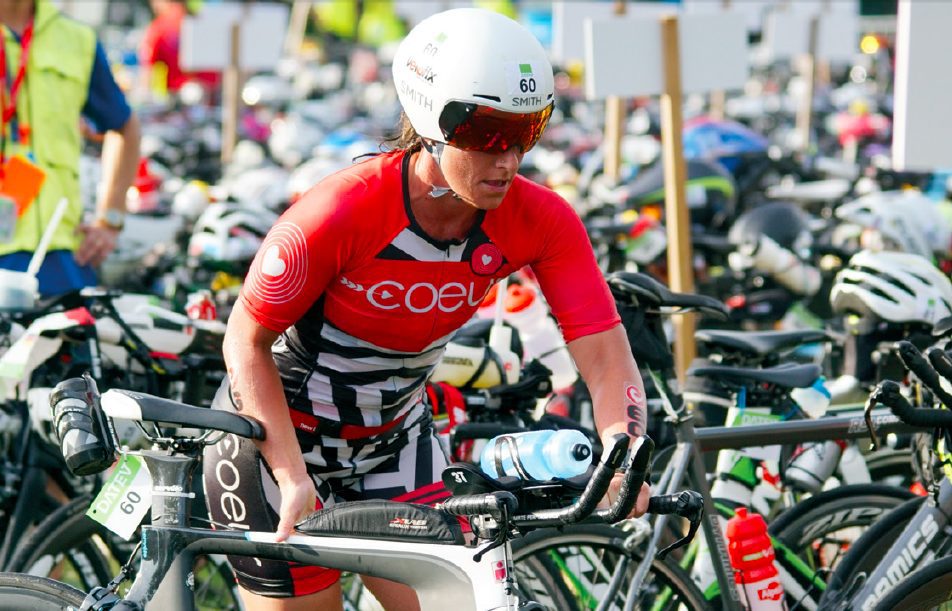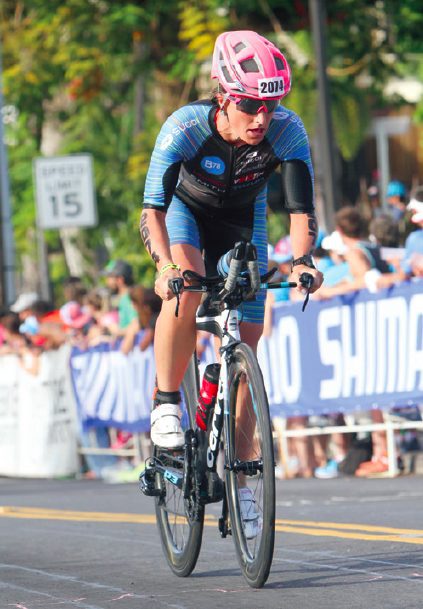Get to know rookie pro Steph Corker


The party and fireworks at the finish line of Challenge Roth are legendary. Among this year’s celebrations, rookie pro Steph Corker came home in an impressive eighth place, achieving a huge personal goal. She won her first paycheck as a professional triathlete.
“The first dollar I earn, I’m not cashing it. I’ll frame it and call it victory,” says Corker.
Corker, 33, from Vancouver is now three races into her first year as a pro. With so many long-course professionals coming from ITU racing or other high-level sports careers, her progression to join their ranks is remarkable. Corker grew up in Ontario and, throughout school, she was a competitive swimmer. Her interest in triathlon only developed when she moved to Vancouver about 10 years ago. Corker happened to be travelling just before Ironman Canada and was in awe of all the triathletes she met on the way.
“On that plane ride I said, ‘By the time I turn 60, I want to do an Ironman.’ I thought that it would take me a lifetime to train for it,” says Corker.
Once settled in Vancouver, she bought a tri bike and began training. It didn’t take her a lifetime to get that Ironman done. Corker made her full-distance debut at Ironman Canada in 2009, finishing well under 12 hours. It wasn’t long before she set her sights on qualifying for the Ironman World Championship.

A major turning point in her triathlon career came when Corker began working with coach Jasper Blake, an Ironman star in his own right.
“Early on one of the biggest changes I saw in her was a willingness to jump in with both feet to the philosophy that I had. Prior to that I think things were maybe a bit more haphazard,” says Blake.
Corker’s motivation to push her limits is apparent in everything she does and, in Blake, she found a coach to focus that enthusiasm. Blake describes Corker as a “dream athlete” to work with.
“One of her greatest gifts is that she’s able to tolerate a heavy training load and recover from it. She’s really committed to the process,” says Blake. Soon after their partnership began her results began an upward trend. In 2012 she finished fourth in her age-group at Ironman Coeur d’Alene, missing out on Kona by a single place. A few weeks later she went one better and came home third at Ironman Canada and, later that year, she raced at Kona for the first time.
Following two years of near misses, Corker returned to Kona in 2015 after winning her age-group at Ironman Canada. The 2016 edition of the race in Whistler proved to be a pivotal moment in Corker’s triathlon career. She had already secured Kona qualification at an earlier event and, with no women’s pro field at Ironman Canada, Corker was the first female athlete across the line by more than 25 minutes. The result gave a mesure of how far she had progressed as an athlete.
“She got to give away a Kona spot because she didn’t need it,” says Corker’s brother, Matt. “That’s when she believed what we believed [that she could turn pro].” Corker raced at the world championship in October last year, but admits that she didn’t have a great day. Following the race, she decided there were two paths to choose from.
“I thought, ‘Do I want to keep racing as an amateur for the quest for a great race in Hawaii? Or would I rather race as a pro and see what it’s like racing with the big girls?’” says Corker.
The safer option was to stay amateur and hope for a perfect day in Kona, but taking the easy route isn’t Corker’s style. Her decision was fully supported by her team.
“I was all for it,” says Blake. “You have to keep putting yourself in positions that are going to push you.”
This willingness to take a risk is mirrored in Corker’s working career. Three years ago she started her own business, The Corker Co., alongside Matt. They offer recruiting and training strategies to help companies find and develop employees.
Health and fitness forms a core part of the work they do and being self-employed complements Corker’s triathlon career perfectly. All of The Corker Co. employees are athletes to one degree or another and they have policies that reflect this.
“We won’t start meetings before 10 a.m. because we know some people have to get in hours of training before the workday,” says Matt. “We also know the importance of flexibility. If you need to go ride your bike outside in the middle of the afternoon, go ride your bike outside.”
Matt’s support of her is unwavering. Alongside Corker’s husband, Dave, he formed the Irontribe – a group of super spectators cheering for her, and the athletes she trains with.
“The Irontribe got its name from the crew of people on race bikes that leapfrog the racers as they go round the course,” says Matt. “We have outfits. We have signs. We even have a map with different destinations [for viewing] marked on it.”
Her step into the world of pro triathlon has meant that this flexibility and support benefits Corker more than ever. She has had to become adept at saying no to things that won’t help her and describes her training as “longer, harder and lonelier than it’s ever been.” Corker credits her husband for his understanding when she sets out on yet another six-hour ride and is thankful to be able to train with fellow Vancouver pro Rachel McBride on a reasonably regular basis.
Corker’s rookie season as a pro hasn’t been without difficulty. Away from the course, she had been fully sponsored as an age-group athlete. Her engaging personality and permanent smile complemented her racing success. Brands were used to seeing her on podiums, showcasing their products. Suddenly she was just another pro and several sponsors backed off or placed performance expectations on her.
Blake for one, is glad that Corker didn’t let this deter her.
“You have to be able to look back in 10 years and say, ‘Are you going to be most proud of staying in one spot because you got another free bike or of taking that pro card and having a real crack?’ There’s only one answer to that in my opinion.”
Her pro racing debut came at Ironman South Africa in March. It was a tough way to start. A regional championship and up against a strong field, including double world champion Daniela Ryf. Corker came home 17th, last of all the female pros to finish.
“I went to South Africa and I was the last pro. But I had the best Ironman race of my life to date,” says Corker. “It was an early season race and there are so many lessons in this. It was a huge race and I didn’t quit.”
The statistics alone don’t tell the full story, with six athletes not completing the event. Corker feels it’s a shame when athletes choose not to finish, whether to save their legs for another race or to avoid coming down the field and disappointing their sponsors.
This is just one aspect of professional racing that she is going to have to get used to. Another is the change in race tactics. Used to being among a big field of age-group athletes, she now starts before the amateurs so has few other racers for company.
Corker is learning fast, and gained further valuable experience from racing at Ironman 70.3 Victoria and Challenge Roth. It shows how much her expectations have shifted that she was slightly disappointed by her result at Roth.
“I didn’t have a great race. It wasn’t terrible. It just wasn’t my best.”
Blake is happy with her performances as a pro so far, and feels that there are positives to draw from her performances.
“She’s taken a bit of a beating,” says Blake. “It’s good to get it handed to you sometimes because it’s humbling.”
Despite earning her first dollars as a pro at Challenge Roth, Corker is still searching for a breakthrough performance to vindicate the hard work she has put in this winter. Next up is a return to her home course in Whistler at Ironman Canada.
Where she goes from there is still undecided. Blake strongly believes she has the ability to become competitive in some of the smaller Ironman events over the next few years. Corker is keen to see where being a pro takes her, but she also got married last year and admits she does eventually want to start a family.
Whatever happens next, it seems certain that Corker will still be striving to be the very best she can be. Oh, and she’ll have a smile on her face.
